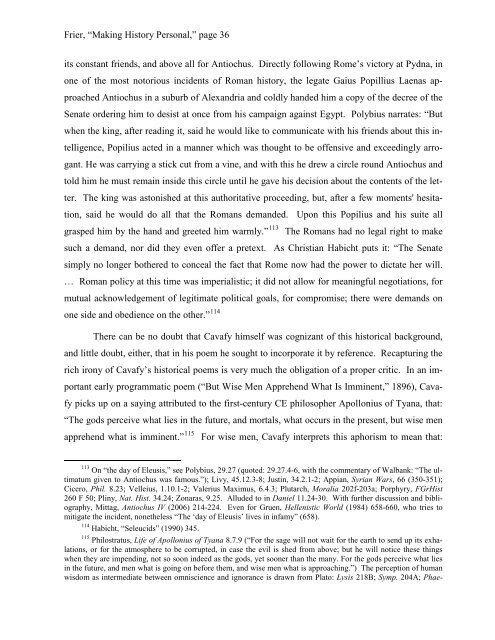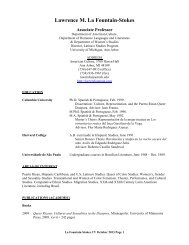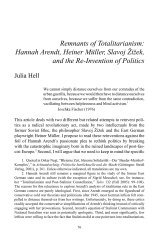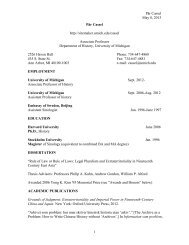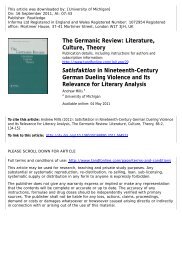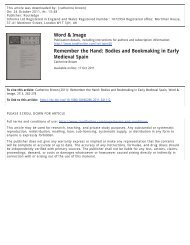Making History Personal: Constantine Cavafy and the Rise of Rome
Making History Personal: Constantine Cavafy and the Rise of Rome
Making History Personal: Constantine Cavafy and the Rise of Rome
You also want an ePaper? Increase the reach of your titles
YUMPU automatically turns print PDFs into web optimized ePapers that Google loves.
Frier, “<strong>Making</strong> <strong>History</strong> <strong>Personal</strong>,” page 36<br />
its constant friends, <strong>and</strong> above all for Antiochus. Directly following <strong>Rome</strong>’s victory at Pydna, in<br />
one <strong>of</strong> <strong>the</strong> most notorious incidents <strong>of</strong> Roman history, <strong>the</strong> legate Gaius Popillius Laenas ap-<br />
proached Antiochus in a suburb <strong>of</strong> Alex<strong>and</strong>ria <strong>and</strong> coldly h<strong>and</strong>ed him a copy <strong>of</strong> <strong>the</strong> decree <strong>of</strong> <strong>the</strong><br />
Senate ordering him to desist at once from his campaign against Egypt. Polybius narrates: “But<br />
when <strong>the</strong> king, after reading it, said he would like to communicate with his friends about this intelligence,<br />
Popilius acted in a manner which was thought to be <strong>of</strong>fensive <strong>and</strong> exceedingly arrogant.<br />
He was carrying a stick cut from a vine, <strong>and</strong> with this he drew a circle round Antiochus <strong>and</strong><br />
told him he must remain inside this circle until he gave his decision about <strong>the</strong> contents <strong>of</strong> <strong>the</strong> letter.<br />
The king was astonished at this authoritative proceeding, but, after a few moments' hesitation,<br />
said he would do all that <strong>the</strong> Romans dem<strong>and</strong>ed. Upon this Popilius <strong>and</strong> his suite all<br />
grasped him by <strong>the</strong> h<strong>and</strong> <strong>and</strong> greeted him warmly.” 113 The Romans had no legal right to make<br />
such a dem<strong>and</strong>, nor did <strong>the</strong>y even <strong>of</strong>fer a pretext. As Christian Habicht puts it: “The Senate<br />
simply no longer bo<strong>the</strong>red to conceal <strong>the</strong> fact that <strong>Rome</strong> now had <strong>the</strong> power to dictate her will.<br />
… Roman policy at this time was imperialistic; it did not allow for meaningful negotiations, for<br />
mutual acknowledgement <strong>of</strong> legitimate political goals, for compromise; <strong>the</strong>re were dem<strong>and</strong>s on<br />
one side <strong>and</strong> obedience on <strong>the</strong> o<strong>the</strong>r.” 114<br />
There can be no doubt that <strong>Cavafy</strong> himself was cognizant <strong>of</strong> this historical background,<br />
<strong>and</strong> little doubt, ei<strong>the</strong>r, that in his poem he sought to incorporate it by reference. Recapturing <strong>the</strong><br />
rich irony <strong>of</strong> <strong>Cavafy</strong>’s historical poems is very much <strong>the</strong> obligation <strong>of</strong> a proper critic. In an important<br />
early programmatic poem (“But Wise Men Apprehend What Is Imminent,” 1896), <strong>Cavafy</strong><br />
picks up on a saying attributed to <strong>the</strong> first-century CE philosopher Apollonius <strong>of</strong> Tyana, that:<br />
“The gods perceive what lies in <strong>the</strong> future, <strong>and</strong> mortals, what occurs in <strong>the</strong> present, but wise men<br />
115<br />
apprehend what is imminent.” For wise men, <strong>Cavafy</strong> interprets this aphorism to mean that:<br />
113<br />
On “<strong>the</strong> day <strong>of</strong> Eleusis,” see Polybius, 29.27 (quoted: 29.27.4-6, with <strong>the</strong> commentary <strong>of</strong> Walbank: “The ultimatum<br />
given to Antiochus was famous.”); Livy, 45.12.3-8; Justin, 34.2.1-2; Appian, Syrian Wars, 66 (350-351);<br />
Cicero, Phil. 8.23; Velleius, 1.10.1-2; Valerius Maximus, 6.4.3; Plutarch, Moralia 202f-203a; Porphyry, FGrHist<br />
260 F 50; Pliny, Nat. Hist. 34.24; Zonaras, 9.25. Alluded to in Daniel 11.24-30. With fur<strong>the</strong>r discussion <strong>and</strong> bibliography,<br />
Mittag, Antiochus IV (2006) 214-224. Even for Gruen, Hellenistic World (1984) 658-660, who tries to<br />
mitigate <strong>the</strong> incident, none<strong>the</strong>less “The ‘day <strong>of</strong> Eleusis’ lives in infamy” (658).<br />
114<br />
Habicht, “Seleucids” (1990) 345.<br />
115<br />
Philostratus, Life <strong>of</strong> Apollonius <strong>of</strong> Tyana 8.7.9 (“For <strong>the</strong> sage will not wait for <strong>the</strong> earth to send up its exhalations,<br />
or for <strong>the</strong> atmosphere to be corrupted, in case <strong>the</strong> evil is shed from above; but he will notice <strong>the</strong>se things<br />
when <strong>the</strong>y are impending, not so soon indeed as <strong>the</strong> gods, yet sooner than <strong>the</strong> many. For <strong>the</strong> gods perceive what lies<br />
in <strong>the</strong> future, <strong>and</strong> men what is going on before <strong>the</strong>m, <strong>and</strong> wise men what is approaching.”) The perception <strong>of</strong> human<br />
wisdom as intermediate between omniscience <strong>and</strong> ignorance is drawn from Plato: Lysis 218B; Symp. 204A; Phae-


